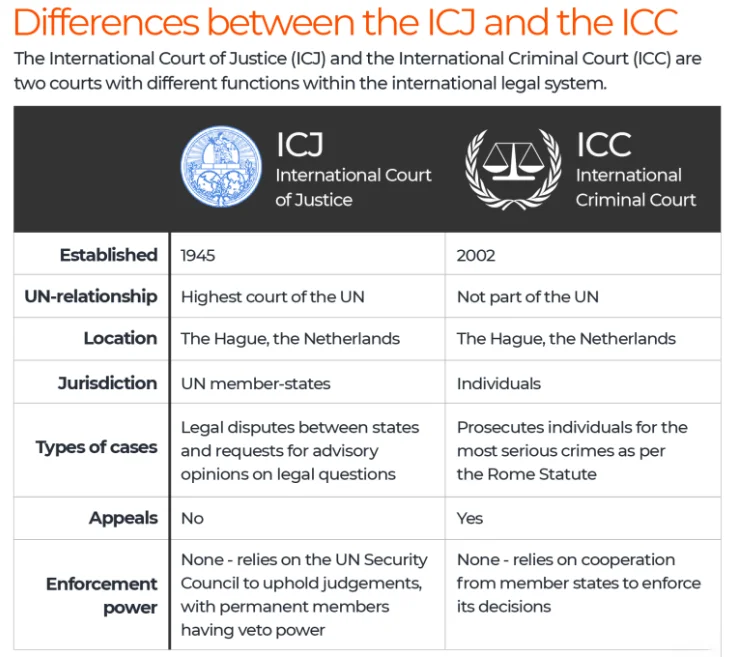ICJ’s Advisory on State Duties for Climate Action | 25 Jul 2025
Why in News?
The International Court of Justice (ICJ) issued a landmark advisory opinion stating that countries can be held legally responsible for their role in driving climate change.
- Earlier in 2021, Vanuatu sought an ICJ advisory opinion on climate change, which gained backing from other UN member states in March 2023.
What is the ICJ’s Stance on State Obligations on Climate Change?
- Climate Action is a Legal Duty: States are obligated under international law to reduce greenhouse gas emissions and adapt to climate change.
- Obligations come not just from the UN Framework Convention on Climate Change (UNFCCC) and the 2015 Paris Agreement (limit global warming to 1.5°C above pre-industrial levels) but also from other environmental treaties like the Montreal Protocol, Convention on Biological Diversity, UN Convention to Combat Desertification and Law of the Seas.
- Obligations are not just for the present but also for protecting the rights and environment of future generations.
- Failure is a Wrongful Act: The ICJ affirmed that all countries, regardless of size or development, have climate obligations.
- Failure to act is an “internationally wrongful act” and may lead to liability, including halting harmful actions, preventing repeats, and compensating affected nations.
- This bolsters global calls for climate reparations and “loss and damage” funding.
- Role of Developed Countries: Developed nations (especially those listed in Annex I of the UNFCCC) must take the lead in reducing emissions and supporting others.
- ICJ noted that protecting the climate is part of fulfilling international human rights obligations.
- Significance: The ICJ opinion, though not legally binding, is expected to have huge influence at the 30th session of the Conference of the Parties (COP 30) in Brazil and influence future climate lawsuits.
- It boosts the push for stronger climate action, especially from historically high-emitting countries, and marks a key moment in climate justice by supporting legal accountability.
What is the International Court of Justice (ICJ)?
- About: The ICJ, established in 1945 and active since 1946, is the UN’s principal judicial body.
- It settles legal disputes between states and provides advisory opinions on international law.
- Based in The Hague, Netherlands it's the only UN organ outside New York. Its official languages are English and French.
- The ICJ settles disputes only between states and gives legal opinions, not criminal verdicts.
- Its judgments are final and binding, with no appeal. Under Article 94 of the UN Charter, UN members must comply. Advisory opinions are non-binding.
- Historical Background: The ICJ evolved from global efforts for peaceful dispute resolution, starting with the 1899 Hague Peace Conference, which created the Permanent Court of Arbitration, followed by the Permanent Court of International Justice (PCIJ) under League of Nations (1922). After World War II, the ICJ replaced the PCIJ.
- Composition: The court has 15 judges elected for nine-year terms by the UN General Assembly and Security Council.
- Significance: It promotes peaceful conflict resolution, upholds international law, clarifies global legal norms (e.g. climate change, self-determination), supports human rights, and strengthens multilateral cooperation.
- India’s Engagement With ICJ:
- Right of Passage over Indian Territory (Portugal v. India, 1960): Portugal was granted the right of passage for civilians but India could block military or political access, affirming its sovereignty..
- Kulbhushan Jadhav Case (India v. Pakistan, 2019): ICJ ruled Pakistan violated the Vienna Convention by denying India consular access and ordered review of its sentence.
Note: The ICJ is separate from the International Criminal Court (ICC), which deals with criminal cases against individuals.
|
Drishti Mains Question: Discuss the mandate of the International Court of Justice (ICJ) and its role in climate governance? |
UPSC Civil Services Examination, Previous Year Questions (PYQs)
Prelims
Q. “Rule of Law Index” is released by which of the following? ( 2018)
A. Amnesty International
B. International Court of Justice
C. The Office of the UN Commissioner for Human Rights
D. World Justice Project
Ans: (D)
Mains
Q. Clean energy is the order of the day. Describe briefly India’s changing policy towards climate change in various international fora in the context of geopolitics. (2022)

